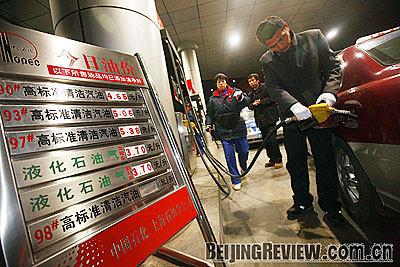|
|
 |
|
FUEL REVAMP: The country's new oil taxation and pricing system is expected to increase oil efficiency at a time of energy shortages |
After years of waiting and debating, the government has finally decided to shake up the country's oil pricing and taxation system, combining a big hike in fuel taxes for consumers and retail price cuts for refined oil.
As of January 1, the consumption taxes on gasoline and diesel were raised fivefold and eightfold, or by 0.8 yuan ($0.12) and 0.7 yuan ($.10) per liter, respectively, according to the National Development and Reform Commission (NDRC), the country's top economic planner.
Meanwhile, the fuel tax, which took effect on January 1, replaces six different fees, including some road and waterway tolls and charges. The government also ordered that pre-collected road tolls be refunded.
The NDRC said the policies were designed to spark more efficient energy usage and promote small-capacity cars with low emissions, although they could also have the effect of curbing domestic oil demand.
To cushion the blow to consumers, the government lowered the price caps on gasoline by about 14 percent, on diesel by about 18 percent and on aviation kerosene by a hefty 32 percent, starting on December 19, 2008.
The collapse of international crude prices has given China some breathing space to introduce some changes to its retail oil pricing and taxation regime. The country's domestic retail price has stayed almost static since 2007 under a government-set pricing system, while the international price has lost almost two thirds of its value after reaching a peak of $147 a barrel last July. The new retail price of oil here will still be double that of the United States.
The price of crude oil on the international market has been lingering at a four-year low of $40 a barrel in recent months as the world economic gloom has eroded global demand. Even OPEC's biggest-ever production cut last December has failed to bump up the price.
Zhuang Jian, a senior economist at the Asian Development Bank, told Beijing Review that the price cut will deliver a timid boost to sagging economic growth by fueling domestic demand as well as bring some relief for oil-dependent sectors, such as automakers and airlines.
Feng Fei, a senior economist at the Development Research Center of the State Council, echoed Zhuang's opinion and said the new prices and taxes were in the long-term interest of the country, because they would help deter excessive energy consumption and promote environmentally friendly transportation in the world's second largest oil-consuming country. The elimination of road tolls also would alleviate some unnecessary cost burdens for consumers who are widely considered a pillar force in digging the economy out of stagnation, Feng added.
But the biggest question facing policy makers now is how to deal with job losses brought about by scrapping the road tolls. But however thorny the issue is, the government will seriously address it and clear the way for the tax reform to go through, said Li Shenglin, Minister of Transport, in a statement. The ministry recently set up a special team to take charge of the reemployment of laid-off toll collectors and reportedly has proposed a program to the State Council for endorsement.
The program consists of three proposals. First, those who are 50 years of age or older can retire early on voluntary basis. Second, some of them can be admitted into local tax departments as civil servants through regular recruitment examinations. Last, some of these workers can be moved to other positions in local transportation departments, such as traffic police and highway toll stations.
The proposed program still needs some improvements and time to materialize, but will result in a flexible and acceptable one in line with local realities, Li said.
Although uncertainties over the tax shake-up remain, it is believed that the government's effort to perfect its retail oil pricing system will not end with the recently lowered retail oil prices.
Speculation about the government's next move has been roaring as the NDRC recently pledged to make the pricing system better reflect international market fluctuations. For years, the country has been adhering to a more or less rigid pricing scheme to which the government makes irregular and infrequent changes.
Among the few details clarified by the NDRC, the pricing mechanism will react more swiftly to international markets within a managed price range, while also taking account of changes in domestic supply and demand.
"We will also factor in consumers' abilities and the national drive of energy conservation and environment protection," the NDRC said in a statement.
"A more flexible pricing regime is, after all, more beneficial for market competition in the long term," said Chen Fengying, a senior economist at the China Institute of Contemporary International Relations, in a statement. "The domestic retail price of refined oil may see another modest drop at the beginning of this year given that the international crude price has dipped to a new low." | 